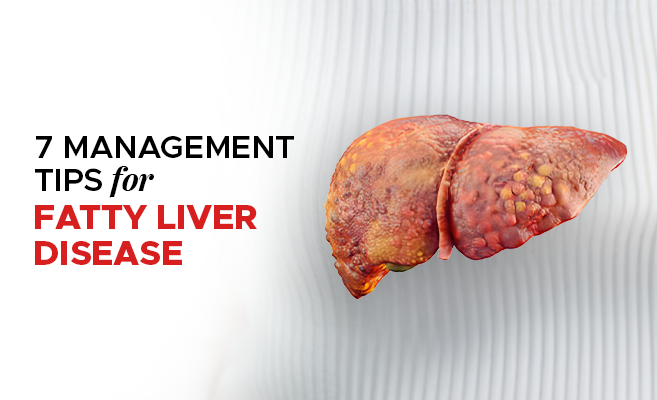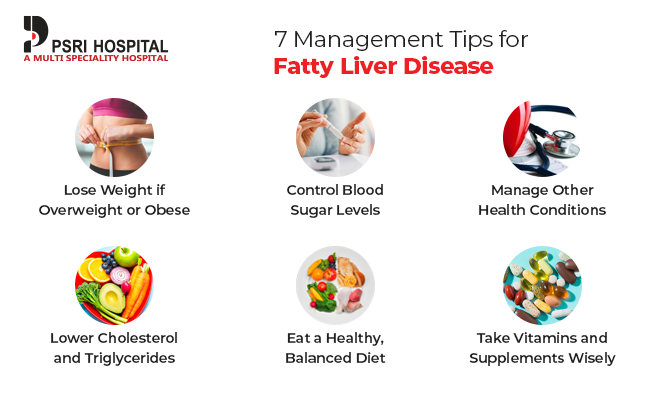7 Management Tips for Fatty Liver Disease

Fatty liver disease, also known as hepatic steatosis, is a condition where excess fat builds up in the liver. It’s normal to have some fat in your liver, but if more than 5-10% of your liver’s weight is fat, then you may be diagnosed with fatty liver disease. The main types are alcoholic fatty liver disease and nonalcoholic fatty liver disease (NAFLD). NAFLD is more common and occurs in people who drink little to no alcohol.
Fatty liver disease is usually harmless in the beginning but can progress over time and cause serious complications like cirrhosis, liver cancer, and liver failure. Thankfully, there are many ways you can manage it through lifestyle changes and medical treatment if necessary. Here are 7 effective tips for Fatty Liver Disease that you should follow.

Lose Weight if Overweight or Obese
The most important thing you can do is lose weight if you are overweight or obese. Excess body fat, especially around the waist, directly promotes fat buildup and inflammation in the liver. Losing as little as 3-5% of your body weight can start reducing the fat in your liver. Aim for slow, steady weight loss through diet and exercise.
Control Blood Sugar Levels
High blood sugar and insulin resistance promote NAFLD. Whether you have diabetes or prediabetes, closely monitor your blood sugar levels and take medication as prescribed. Choose low glycemic index foods that do not spike your blood sugar. Increase physical activity to help control blood sugar as well.
Manage Other Health Conditions
Get any other health conditions under control, especially diabetes, high blood pressure, and high cholesterol. These make NAFLD worse and increase your risk of serious liver complications. Work closely with the best gastroenterologist in South Delhi to manage these conditions.
Lower Cholesterol and Triglycerides
Having high cholesterol and triglycerides makes NAFLD worse. Lifestyle changes and sometimes medication can help lower these blood lipids. Limit saturated fats, trans fats, sugar, and refined carbohydrates. Include foods that improve cholesterol, like nuts, avocados, olive oil, and fatty fish.
Eat a Healthy, Balanced Diet
Focus your diet on whole, unprocessed foods like fruits, vegetables, whole grains, healthy fats, and lean protein. Avoid processed and fried foods, which can damage liver cells. Do not strictly restrict calories or follow fad diets as rapid weight loss can backfire. Consume alcohol in a small quantity.
Take Vitamins and Supplements Wisely
Certain vitamins and supplements, such as vitamin E, vitamin C, milk thistle, and glutathione, can help support liver health. However, only take these under medical supervision at the correct dosages. Some supplements can actually harm the liver if taken improperly.
See Your Doctor Regularly
Schedule regular checkups with your doctor to monitor your liver health. The best gastroenterologist in South Delhi checks your liver enzymes, performs imaging tests if needed, and determines if you require medication. Catching fatty liver disease early and making lifestyle changes can help prevent permanent damage.
Conclusion
In most cases, fatty liver disease can be managed and even reversed through healthy lifestyle measures. Losing weight, eating right, and controlling related health problems are key. If caught early, most people can prevent NAFLD from progressing. Work closely with your doctor and be disciplined with both diet and exercise recommendations. With a commitment to better health, you can keep your liver functioning optimally.
And if you are looking for the best hospital in India for International patients, PSRI Hospital is here to help you. Our team of the best doctors can evaluate your liver condition and suggest the best course of action with utmost care and professionalism. Book an appointment with the best gastroenterologist in South Delhi to learn more.
FAQs
What foods should I avoid if I have fatty liver disease?
Avoid foods high in saturated fats, added sugars, and refined carbohydrates like certain red meats, fried foods, sugary baked goods, candies, sodas, white bread, etc. These foods can promote fat deposition and inflammation in the liver.
How often should I exercise for fatty liver disease?
Aim for at least 150-300 minutes of moderate exercise per week for fatty liver disease, which includes things like fast walking, cycling, and swimming. This can significantly reduce liver fat, improve insulin resistance, and help prevent further liver damage.
Does fatty liver disease go away once you lose weight?
Fatty liver disease may go into remission with significant weight loss. However, the excess fat in the liver may return if you regain the weight. Losing weight progressively and keeping it off long-term is important for reducing liver inflammation and preventing permanent scarring.
Does fatty liver disease cause fatigue and weakness?
Fatty liver disease itself often produces no symptoms until the later stages. However, the related metabolic conditions like obesity, metabolic syndrome, and diabetes associated with NAFLD can make you feel tired, weak, and fatigued. Managing these problems can improve energy levels.
Are there medications that treat fatty liver disease?
Currently, there are no medications specifically approved for the underlying fat accumulation of NAFLD. However, your doctor may prescribe medications to help manage related conditions like high cholesterol, high blood sugar, and high blood pressure, which improve fatty liver disease.

 Book An Appointment
Book An Appointment Virtual Consultation
Virtual Consultation




